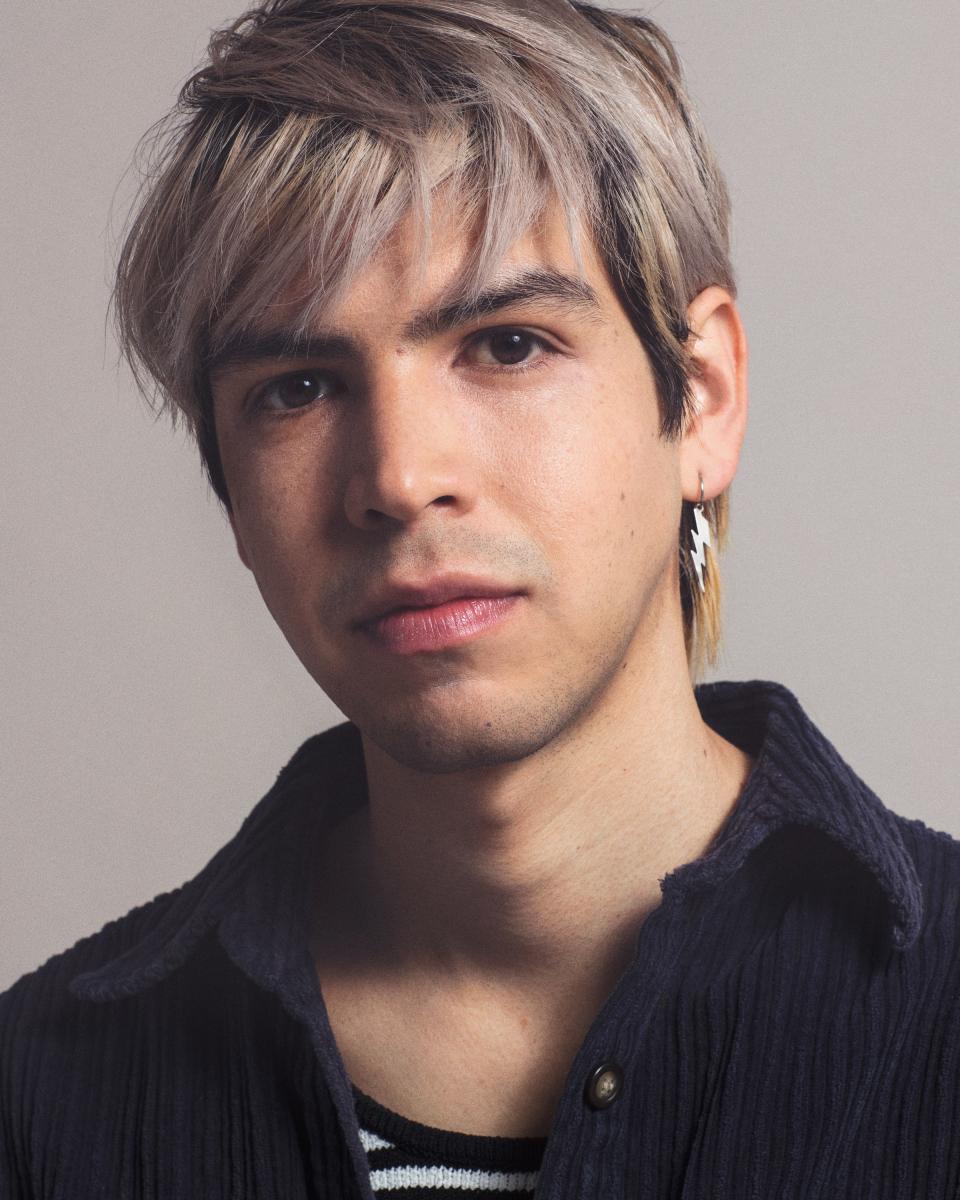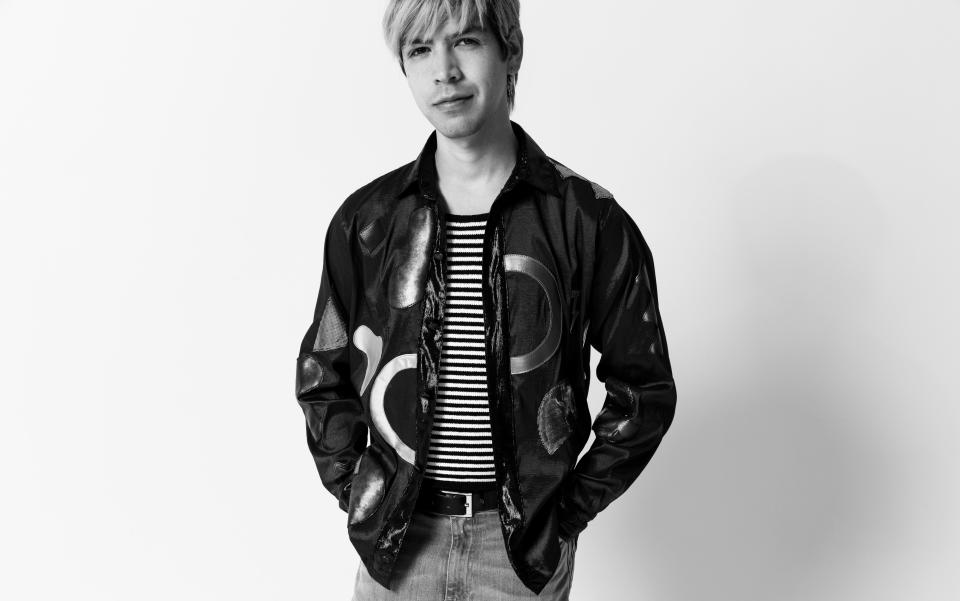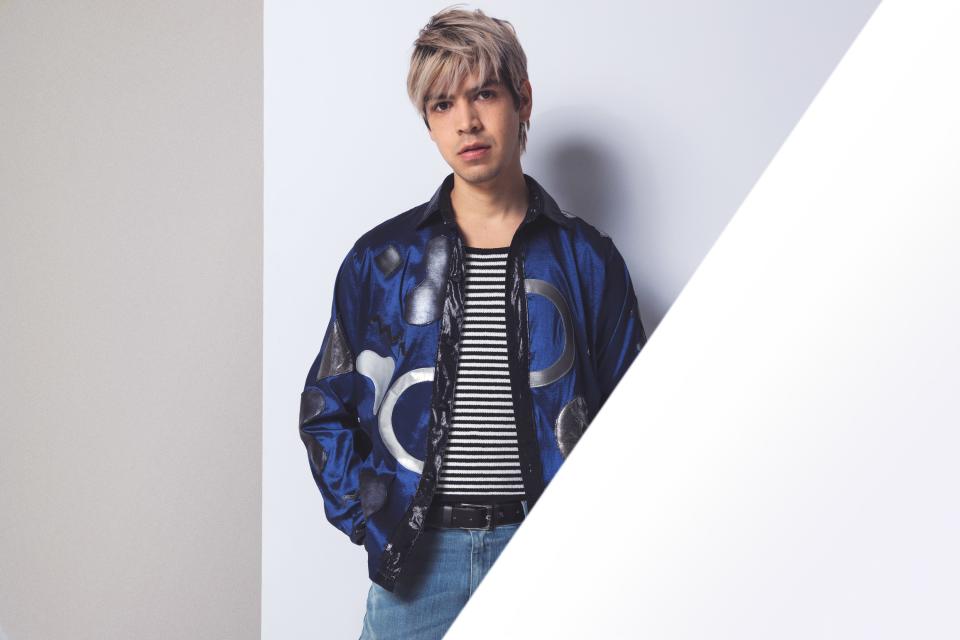Julio Torres Is Changing the Shape of Comedy
Julio Torres is obsessed with shapes. So much so that the up-and-coming comedian and Saturday Night Live writer created an entire stand-up show called—you guessed it—“My Favorite Shapes,” dedicated to showcasing tiny trinkets and bizarre objects that he likes. “It’s basically like when you talk to your nieces or nephews and they're showing you a toy telling you what it does and what they're thinking,” he says. This is Julio Torres in his element—taking the macro and making it more.
Torres has an acute ability to draw out the hilarity of the seemingly banal. Say, for example, writing an entire sketch centered around the Papyrus font used in the Avatar movie logo. It’s what makes Torres one of the freshest and most unique voices in comedy right now. You may recognize the millennial stand-up from his appearances as a twisted, Jimmy Fallon-breaking correspondent on The Tonight Show, but you’re probably most familiar with his work behind the scenes at Saturday Night Live. In his less than two years on the show, Torres has written his fair share of viral hits including the brilliant aforementioned “Papyrus” short in which a tormented Ryan Gosling tracks down Avatar director James Cameron to air his grievances over the movie’s title font, and the much-heralded commercial parody “Wells for Boys,” which imagines a Fisher-Price well playset for kids who “want to be understood.”
We caught up with Torres during the show’s winter hiatus to talk about how his mother influenced his comedy, what he thinks is really going on inside Donald Trump’s head (spoiler: nothing good!), and what to expect from his upcoming HBO pilot with Fred Armisen.
GQ: How did you end up on the New York comedy scene?
Julio Torres: I’m originally from El Salvador. I've been in New York for almost 10 years. I moved here to go to school. But school was just the excuse to figure out how to be here and remain here. At the time the goal was a very nebulous writing and/or comedy job.
Was working in comedy always the goal?
Yeah. I wanted to write for TV and I wanted to write for film. But I had no idea how to do any of those things after I graduated so I started doing stand-up as a means of writing, and exposing what I write.

How did your upbringing in El Salvador influence your comedy?
Comedy didn't really come about until later in my life. It's not like I was a kid watching stand-up and wanting to do that. The biggest takeaway from those years is that my mother is very visual and she's very attuned to what shapes and colors and design communicate. That’s something that I've carried into my comedic work. In fact, I think both my parents were surprised that I wasn't doing something that was strictly visual because I've always gravitated towards that. We used to have this house where my mother designed every piece of furniture in it. Everything was accounted for by the inch. She had a potted plant and a dining table, and she wanted both, so she designed a dining table with a hole for the potted plant.
Do you have a favorite shape?
I use to connect to a square a lot. When I had graduated college and I was on a mission to find a way to stay in the country, which as an international student is not easy, I was very disciplined and I only wore black and white because I thought, I don't need any stimulus that's not productive. I became vegan, I was very disciplined, I was just wearing black, and at the time I just felt like a square. There was no room for anything else to come in or go out. Just doing what I was doing, inflexible. Now, I don't know, I don't feel so much like a square anymore.
What shape would best characterize you know?
I've been wanting to do something with clear tubes for a while. I've been trying to think about what to do with that image. You know how the Jetsons’ elevators would just go into a clear tube, and they would zoom about the city? I've been thinking about that a lot. I've been thinking about hamster tubes a lot.
You have a such distinct comedic voice. Is that something that came naturally to you or is it something that you honed over the years?
It's certainly not something that I've practiced or was mindful of. I just started to do the kind of work that I wanted to do and the only way I know how and that's how that happened. Certainly at no point did I decide, my thing is this.
Except for my very, very first time doing stand-up where it was almost like I did an impression of what I thought a stand-up comedian should be, forcing myself to do observational comedy, down to taking the mic out and leaning on the stand. That felt so strange and artificial and then I was just like, “Why don't I try doing what I want to do?”
In this political climate, do you feel a responsibility to address certain topics that you might not normally have touched?
As a comedian, I started very apolitical. I definitely never talked about current events or matters of identity, or any of these topics that now weirdly I am intricately connected to. A lot of us young people went from sort of not caring to being hyper-aware of it. It's not like I made a conscious decision to start talking about these things. They’re just in my mind now. That’s the case for so many of my peers.
It’s not that it’s trendy or something—it literally affects your life. I’m also slowly learning that to many people my presence is inherently political even if I don't do anything. Even if I'm talking about a vase, the work inherently has an agenda because of who I am and the labels that people attach to me. It took me a bit to recognize that.
Do you feel any pressure from that?
No, not really. Before I was really known, I kept having these conversations with people who said, “How about you write something about being Latino?” Or, “So much of the industry loves an abuela thrown in there—or an immigration story.” Stuff like that. Those things come across but not in the form that most people would expect. I touch on those subjects without it being, “This is what it's like to go to your abuela’s for Christmas and then everyone eats so much” or whatever.
You’ve taken a unique comedic angle on Donald Trump in your work. How do you approach the president in your writing?
When I think about Donald Trump, I always end up trying to pick apart his psyche because it feels like something’s so foggy in there that it's almost hard to penetrate. Then I go to the people next to him. The psychology is just so interesting and broken. It's like one day there’s one thing, the other day is something entirely different. It's very hard to understand what his true morals are because at the end of the day his priority is himself.
I feel like if Trump got some data on his desk today that said, “Actually your base loves immigrants, we got it all wrong! They're all for reproductive rights and gay rights!” He'd be like, “Okay cool” and then would change completely. It's almost like pop artists have more integrity because Madonna will continue being Madonna even when it's poorly received or well-received, as opposed to changing the beat of your drum when it’s convenient.
Do you draw inspiration from people like Madonna?
Yeah, I like anyone who has a very strong sense of self and will continue to do that despite all odds. I remember being a kid and thinking Michael Jackson was the coolest person on Earth. I still think that. Of becoming this thing that is larger than a person. I love that. To me there's something so great about a singer who's very great and successful and does great work even though they don't have the best voice. Or a painter who’s extremely successful in what they do but they can't draw like a realistic portrait. I find that very fun and very stimulating.
Who are your favorite comedic voices out there right now?
Everyone loves John Early and Kate Berlant because they're so true to themselves. You're never going to see Kate doing anything but the fantastic thing that she does. You're never going to see something where you think she took the network notes and she's not the cookie neighbor in the sitcom. My good friend Ana Fabrega is fantastic and also unwavering in her point of view. I have huge respect and admiration for Lorelei Ramirez, who will sink or swim doing her thing and it's just not going to change unless she wants it to change.
You’ve appeared on The Tonight Show multiple times as a monologue correspondent. How did that come about?
That happened because I was doing Halloween jokes on Twitter. Then a couple of friends of mine that work there, Jo Firestone and Albertina Rizzo, were like, would you want to come and do that thing here? Then I just bombarded them with a lot of those types of jokes and then they sorted them out and we did that two more times.
It’s neat that Fallon is featuring new and alternative comedy voices like you, John Early, Kate Berlant, Yamaneika Saunders...
There's something very exciting about people who wouldn't have necessarily had a voice in a big giant very popular network show to be able to go and do that.
In terms of expressing yourself, how do you feel about fashion?
It is important to me. There’s a blur between what I think of performance wear and everyday stuff. I only wore black when I was trying to figure a lot of stuff out. I like thriving within boundaries that I set for myself. My mom actually helps me make clothes.
You make your own clothes?
Yeah. My mom and my sister know a tailor down in El Salvador—I'll sketch something and they'll help out and then it'll get made. I love the idea that this thing didn't exist in the world, but I needed it, so it's now made.

If it was possible, would you prefer to design everything in your wardrobe?
Oh, absolutely. Weirdly enough because my mother was always making everything in our lives and having a creative control over everything there was still weirdly a level of shame that I have for buying clothes. I've been like, this is so easy and like a million people have this.
When you do go shopping, where do you shop?
Just vintage stuff because that feels like it's at least a step removed. There's something that I just can't stomach about going into a store and seeing ten of them in a rack and just finding my size. That is just unforgivable.
You’re wearing some great accessories. Where’s that watch from?
It is broken, but I really like it. It again reminds me of the Jetsons. I got it in Berlin at a junk shop for two euros or something like that.
What about the lightning bolt earring?
It was just one of those things where I woke up one day feeling like I needed a lightning bolt and I'd never had a piercing before and I just did it. I've been thinking of switching up the lightning bolt for something else, another dangling thing, I don't know what that is. I bought a heart, a silver heart but that didn't feel right.
I hear you have a new project in the works with Fred Armisen.
It's a pilot. It's a show for a trio. It's a scripted half-hour Spanish-language comedy for HBO.
How did you and Fred connect?
I met him for the first time when he hosted SNL. It was like my third show there. Then we kept in touch and he told me about this idea and it just sounded so great. I've always admired his work.
What’s the premise of the show?
[It] follows a group of horror makeup artists in Mexico City, a group of friends who are very into horror make up. The thing about people in that world is that they are so passionate about it. They live and breathe these things, which I can sympathize with a lot.


